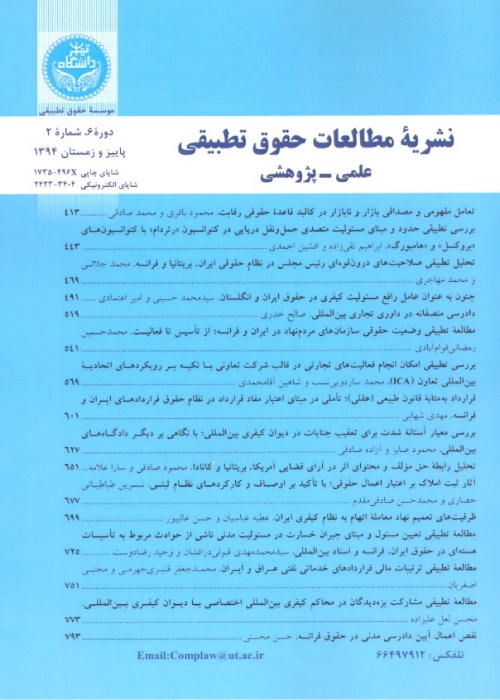A Comparative Study of Duty to Retreat from the Position of Self-defense in Common Law and Imamiyah Jurisprudence
Self-defense is a defense that is often raised by defendants in a criminal trial who were involved in a fight with the victim that resulted in the victim’s serious injury or death. The law recognizes the right that someone has to protect his or her own person. but there is some situations which sometimes appears in the criminal defense of self-defense, and which must be addressed if criminal defendants are to prove that their conduct was justified One of these situations in self- defense is that the attacker has started his attack but yet Necessity condition has not existed and the defender has ability to retreat and escape. The key question is whether he has to retreat against the offensive attack or he can continue based on the right to defend himself? This article explores the doctrine of self-defence within the context of the challenges about duty to retreat. This principle requires that someone who found themselves in a violent confrontation had to try to defuse the situation and retreat. In fact the general principle behind the duty to retreat laws is that the use of force - lethal or otherwise - is not justified until a person has made a reasonable effort to avoid confrontation, either by de-escalation or an attempt to leave the area where the threat is occurring. common law in the recent centuries based on the lesser evil and more benefit as a society theory, would require the defender to retreat, since escape is a way to realize the survival of the attacker (more benefit) and reduce the probability of crime (less evil). Failure to do so, despite the achievement of all other conditions of defense, causes rejecting the defense principle. English common-law doctrine strictly limited the cases to which Stand Your Ground applied and earliest American self-defense doctrine imposed a general Duty of Retreat, but now also admitted exceptions such as "Castle Doctrine" it is named for the axiom that "a man's home is his castle. In the imamiyah jurisprudential texts, the issue of duty to retreat is stated after the defense principal and is only intended to emphasize the protection of the defender during his inability to attack the attacker. Therefore, if the conditions of defense are achieved, the principle of the defense is dominant, and his failure to escape has not a legal effect. German criminal law, based on the individualist theory of the rights to defense, rejects duty to retreat. this theory states that a person "who is attacked" anywhere he is lawfully present has no duty to retreat and has the right to stand his or her ground and meet force with force, including deadly force if he believes it is necessary to do so to prevent death or great bodily harm. But based on the principle of the responsibility of the attacker in the private defense in German criminal law, in the defense against the invasion and children the defender has to retreat or it is considered as a duress defence. Therefore, the defender in these cases is required to retreat. Because he, in the absence of a retreat with the possibility of doing so, he himself is guilty of creating his own duress condition and this is a case of defying his defense.
- حق عضویت دریافتی صرف حمایت از نشریات عضو و نگهداری، تکمیل و توسعه مگیران میشود.
- پرداخت حق اشتراک و دانلود مقالات اجازه بازنشر آن در سایر رسانههای چاپی و دیجیتال را به کاربر نمیدهد.



